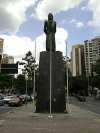 Eric Harris and Dylan Klebold were seniors at Colorado’s Columbine High School when they carried out one of the deadliest school shootings in US history, killing 12 students and one teacher and injuring 21 others before taking their own lives. The incident, widely covered by the media, stirred debate about the pair’s motivation for the killings, the availability of firearms, and the role of bullying, video games, and music in acts of violence. For what crime had the two been previously arrested? Discuss
Eric Harris and Dylan Klebold were seniors at Colorado’s Columbine High School when they carried out one of the deadliest school shootings in US history, killing 12 students and one teacher and injuring 21 others before taking their own lives. The incident, widely covered by the media, stirred debate about the pair’s motivation for the killings, the availability of firearms, and the role of bullying, video games, and music in acts of violence. For what crime had the two been previously arrested? Discuss
Source: The Free Dictionary
 The Inconfidência was a colonial uprising for
The Inconfidência was a colonial uprising for  After moving to Paris in 1778, Pinel, a French physician, was appointed director of the Bicêtre and Salpêtrière hospitals. His experiences there prompted him to advocate for the humane treatment of mentally ill persons—then called the insane—and for the empirical study of mental disease. He further contributed to the development of psychiatry by establishing the practice of thoroughly documenting psychiatric case histories for research. What initially inspired Pinel’s interest in mental illness?
After moving to Paris in 1778, Pinel, a French physician, was appointed director of the Bicêtre and Salpêtrière hospitals. His experiences there prompted him to advocate for the humane treatment of mentally ill persons—then called the insane—and for the empirical study of mental disease. He further contributed to the development of psychiatry by establishing the practice of thoroughly documenting psychiatric case histories for research. What initially inspired Pinel’s interest in mental illness?  Calorie restriction (CR), a diet known by many names, is the practice of limiting dietary energy intake with the intention of improving overall health and slowing the aging process. While caloric intake among practitioners is limited, care is taken to ensure that dieters receive adequate vitamins, minerals, and nutrients. CR has been shown to lower cholesterol, blood pressure, and fasting glucose in human subjects. What are some of the criticisms of this diet?
Calorie restriction (CR), a diet known by many names, is the practice of limiting dietary energy intake with the intention of improving overall health and slowing the aging process. While caloric intake among practitioners is limited, care is taken to ensure that dieters receive adequate vitamins, minerals, and nutrients. CR has been shown to lower cholesterol, blood pressure, and fasting glucose in human subjects. What are some of the criticisms of this diet?  The Battles of Lexington and Concord were the opening engagements of the American Revolution. While marching from Boston to Concord to seize colonists’ military stores, a British force of 700 was met at Lexington by 77 local minutemen. After a brief exchange of shots, the outnumbered colonists fell back. The British continued on to Concord, where they were defeated by a militia of about 500. Who had been sent to warn the people of the Massachusetts countryside about the impending British attack?
The Battles of Lexington and Concord were the opening engagements of the American Revolution. While marching from Boston to Concord to seize colonists’ military stores, a British force of 700 was met at Lexington by 77 local minutemen. After a brief exchange of shots, the outnumbered colonists fell back. The British continued on to Concord, where they were defeated by a militia of about 500. Who had been sent to warn the people of the Massachusetts countryside about the impending British attack?  A major
A major .jpg) Ricardo was a British economist who made a fortune in the stock market before turning to the study of political economy, publishing his major work, The Principles of Political Economy and Taxation, in 1817. According to his labor theory of value, the value of almost any good is a function of the labor needed to produce it; thus, a $10 watch requires ten times more labor than a $1 pencil. According to his “iron law of wages,” what keeps wages stabilized around the subsistence level?
Ricardo was a British economist who made a fortune in the stock market before turning to the study of political economy, publishing his major work, The Principles of Political Economy and Taxation, in 1817. According to his labor theory of value, the value of almost any good is a function of the labor needed to produce it; thus, a $10 watch requires ten times more labor than a $1 pencil. According to his “iron law of wages,” what keeps wages stabilized around the subsistence level?  Underwater archaeology, a branch of maritime archaeology, is the study of past human life, behaviors, and cultures using the physical remains found in bodies of water or buried beneath water-logged sediment. Researchers in this field generally examine the sites of shipwrecks, submerged airplanes, structures created by humans in water bodies, and places where people once lived that have since been flooded or covered by water. How do divers record their findings underwater?
Underwater archaeology, a branch of maritime archaeology, is the study of past human life, behaviors, and cultures using the physical remains found in bodies of water or buried beneath water-logged sediment. Researchers in this field generally examine the sites of shipwrecks, submerged airplanes, structures created by humans in water bodies, and places where people once lived that have since been flooded or covered by water. How do divers record their findings underwater?